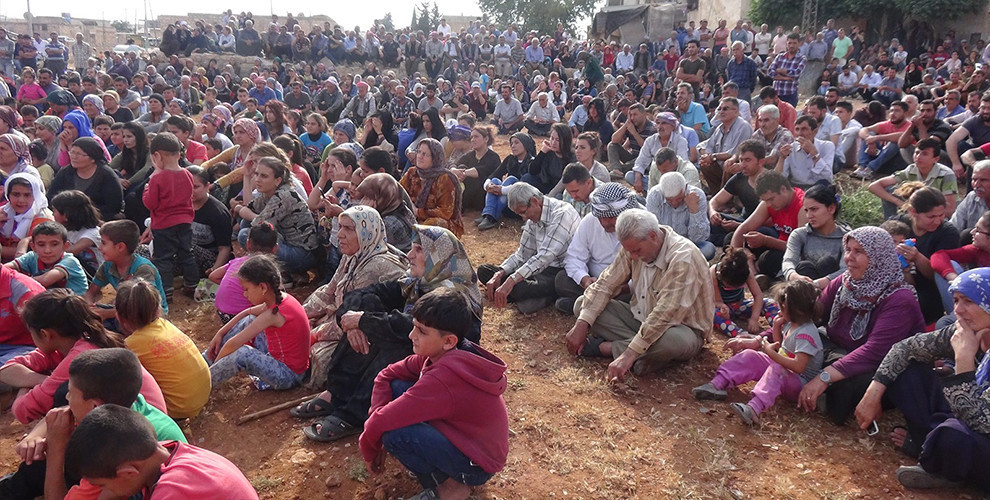Report on the refugees from Afrin in Shehba published
Refugees who had to leave Afrin are facing harsh conditions in camps despite the Autonomous Administration efforts.
Refugees who had to leave Afrin are facing harsh conditions in camps despite the Autonomous Administration efforts.

A new report on the situation of refugees in Shehba camps has been released by the Canton of Afrin Autonomous Administration and Shehba Foreign Affairs and Diplomatic Committee.
When displaced people arrived in Shehba, the province was not prepared to receive them.
Following the attacks by the Turkish state against Afrin and surrounding villages on 20 January, people from the area were forced to leave their houses in thousands.
Displaced people were dispersed between villages and farms, many of which still covered of mines left by DAESH, which had previously occupied the area.
The Autonomous Administration despite the little resources and limited capabilities has set up the Berxwedan (Resistance) camp, near Fafin.
A second camp was set up in Tal Susin on behalf of the Serdem refugee camp, and another special camp for the Roma was set up at their request to maintain their privacy.
Berxwedan Camp
The Berxwedan Camp, recalls the report, was established on 20 March 2018. Located about 15 km north of Aleppo, and about 40 km away from the city of Afrin the camp has 800 tents but it is constantly growing.
The camp was divided into 13 administrative units, which oversee the distribution of aid and primary products and work to organize the camp.
The camp is now home to about 3,000 people, around 650 families.
Most of the displaced people there are from Afrin. In addition, there are some displaced families from the neighboring areas of Idrin, Idlib, Deir Azza, and the southern Aleppo countryside, as well as other Syrian governorates.
There are many challenges related to providing clean and safe housing. There are also many health problems, and an insufficient sewage network has caused diseases and polluted drinking water.
People in the camp suffer from stomach and kidney diseases and diarrhea.
Children are those suffering most. They are denied schooling as well as a normal life.
Children’s educational, recreational and nutritional needs are not being met. The nutritional problems specifically have caused anemia and lack of growth in children.
Pregnant women are also suffering because of the lack of necessary medicines and the siege imposed on roads leading to Shehba.
In addition to this, there are incurable cases where patients must be transferred to hospitals in Aleppo.
The report underlines that there are no medicines and pesticides to fight harmful insects, rodents, snakes, and scorpions so common in the summer months.
There are no fans to cool the tents, and there are no refrigerators to keep food safe from heat and insects.
The lack of fuel oil leads to reduced hours of electricity.
The Autonomous Administration calls on "all concerned parties to ensure the safety of the roads in order to send ambulances to the hospitals in Aleppo."
Likewise the Autonomous Administration demand "the delivery of necessary medicines so that we can adequately treat patients. We require a medical staff that can deal with all medical specialties".
Efforts to ensure education
Fifteen education tents and a teaching staff of 25 teachers were appointed to oversee the education of 405 children of the camp who are under the age of 11.
This school is composed of six classes of elementary level, from grade 1 to grade 6. The school suffers from a severe shortage of school supplies.
The most important of these are desks, paper, and school bags.
Bad conditions in the schools threaten the educational future of these students, and their future professional and career prospects as well.
Serdem Camp
This camp was established on 29 march, recalls the report, and has become operational on 10 April.
There are 391 tents in the camp, housing 676 women and 588 men.
There are 72 children under 6 months, 116 children up to two years, and 102 children under 5 years. There are 211 primary school students, 105 preparatory school students, 35 secondary school students, and 7 university students.
62 people have chronic diseases, and 35 have special needs.
The camp has been organised in 13 districts. Each district is led by two co-chairs (one woman and one man).
In each district, there are service, health, protection, and social welfare committees.
Situation of Women in the Camp
Women live a hard psychological situation in these difficult circumstances, as they are responsible for raising their children, keeping their families together, and maintaining social, moral cohesion in light of the changes that have taken place during the displacement.
Women in the camp need jobs in order to secure the needs of their families.
Situation of Men in the Camp
The situation of men, said the report is not much different from that of women. Lack of jobs is the main problem.
Situation of Children in the Camp
Children in the camp need special care, as they have been subjected to harsh conditions as a result of the war launched by the Turkish state.
They need recreational activities and games to fill their free time.
The report said the Autonomous Administration has managed to "set aside a tent and put in a television for them."
Full report can be reached at: